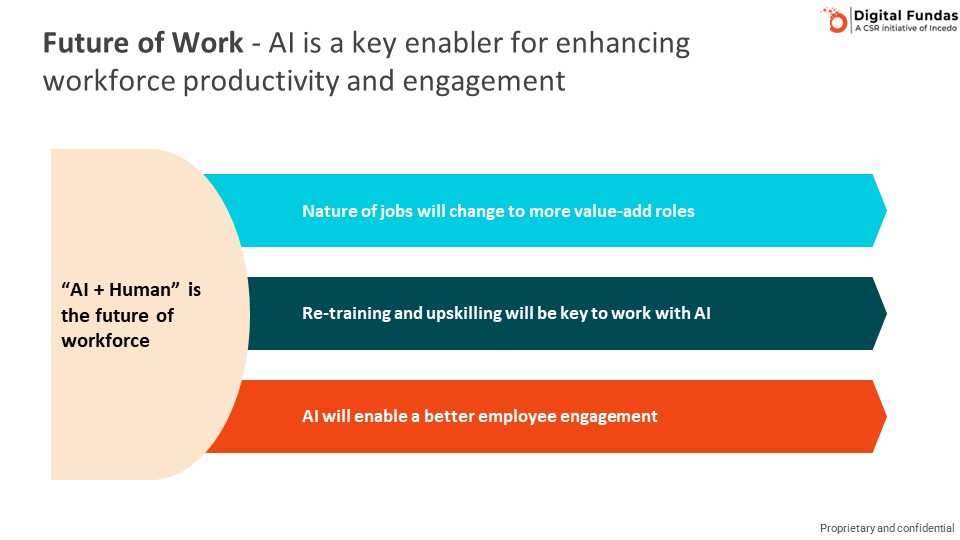
Jobs as they exist today will certainly be impacted by AI. But it is certainly not a situation of man-versus-machine (as is often portrayed in the media) but one of man-with-machine. The sooner we realize that and understand the underlying nature of AI technologies, the more we will be able to harness them and benefit from them.Here are some simple points about AI technology and its impact on nature of jobs:
The debate above makes it clear that the advent of AI does not spell doomsday for the workforce but could be a great opportunity to make jobs more meaningful and rewarding. However, to realize AI as an opportunity would require massive investments into relearning and upskilling.
Relearning and upskilling need to be on two dimensions:
The most fundamental and durable skills for success in the future will be:
One of the fast-emerging applications of AI is support of employee engagement, which can contribute to a happier, healthier and more productive workforce. There are many emerging tools with applications such as sentiment analysis – which helps in attrition management – HR support, learning and development, performance management and even job design. A short note about each of these applications:
We should make no mistake that AI will impact every job to a certain extent. This can be an opportunity but would require a rethink on how the job would look like in the future and call for upgradation of skills to be relevant and effective in that future. Responsibility for this relearning and upgradation of skills lies with the organization but is most fundamentally with the individual himself. The impending change is so significant that you have to take charge of your future yourself. Moreover, the explosion of e-learning has now democratized access to knowledge and has placed access to learning in the individual’s hands. Eventually, the changes that AI will bring over a period of time are so far reaching that skill building for the new era of jobs will need to start in schools and colleges, where curricula will need to be substantially rethought and upgraded.
AI can enable dynamic assessments and more personalized and targeted employee interventions. Therefore, it has the potential to be a significant enabler of employee engagement, productivity and satisfaction in the digital age. However, like most things with AI, there is an ‘other side’ to consider here too. AI-based employee engagement can lead to a ‘Big-Brother-is-always watching’ type of environment, which is not only intrusive but potentially dangerous.
Privacy guidelines and data access are important considerations to ensure that the vast amount of employee data available with the enterprise is not misused.
So, that bottom line is AI has its place, as do humans, and we are NOT headed for a zero-sum showdown between humans and machines! AI will certainly have a very significant impact on jobs, and more fundamentally on the nature of work. It should develop as a force of good and a net positive, both for jobs and workforce productivity and engagement. However, for that to happen, considerable effort needs to be made on the design of jobs, significant upgradation of skills, and aligning of skills to the emerging needs. That choice is in our hands!